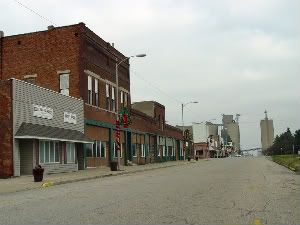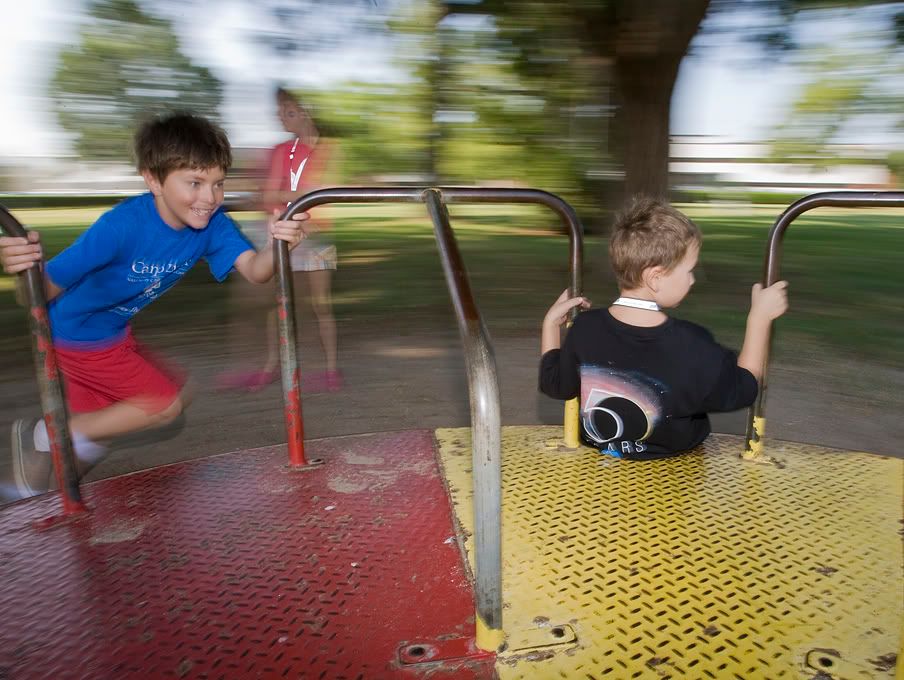I know it hasn't been long since I sent you the last letter, but I had to let you know about the dream I had last night, or should I say nightmare.
 Right away, you'll know I'm getting to be an old geezer when I tell you that it was about a merry-go-round. Back when I was a kid, we didn't have i - pods and x - boxes or even g - strings. We had to find our thrills in the real proton/neutron/electron world around us rather than in virtual reality. We were so hard up that it was quite a thrill to whirl around on the merry-go-round that most of us had in the school playground. Here's a picture of one in case you don't know what they are. (I'm the kinda dopey looking one with the hat.)
Right away, you'll know I'm getting to be an old geezer when I tell you that it was about a merry-go-round. Back when I was a kid, we didn't have i - pods and x - boxes or even g - strings. We had to find our thrills in the real proton/neutron/electron world around us rather than in virtual reality. We were so hard up that it was quite a thrill to whirl around on the merry-go-round that most of us had in the school playground. Here's a picture of one in case you don't know what they are. (I'm the kinda dopey looking one with the hat.)I don't know whether our school's sixth-grade boys were any more perverse than the rest, but they did have a mean game they liked to play when I was a second-grade runt. They'd put as many of us little kids on the merry-go-round as they could squeeze, then the speediest and strongest six-graders would push that old merry-go-round as fast as it would go. Those big kids never jumped on. Once they had it whirling they just stood back and laughed as we little ones first opened our eyes wide in terror and then turned green with dizziness. Occasionally, some little kid would get so disoriented that he would fall completely off the merry-go-round. That produced quite a roar from the bullies.
Now later on, I got so I really enjoyed a fast ride on the merry-go-round, and trust me, I never did pile little kids on and turn them around fast enough to make them sick, even when I was a sixth-grader. That experience of getting thrown off the merry-go-round must have made a deep impression on me, though. (Yeah, I was one of the ones who was thrown off.) Last night, my brain made some connection between what happened back then and my situation now.
When you think about it, our American economy has become a lot like a merry-go-round. It's not the sixth-graders who are making people whirl around so fast that it terrifies them and makes them sick. It's guys named Lewis and Blankfein and Dimon who have things spinning so fast that six million of us have been thrown completely off the economic merry-go-round in the last eighteen months. I don't know if they're laughing at all of us like those sixth-graders did, but they sure don't seem to give a damn about our predicament either.
And they're sure not doing anything to slow down that merry-go-round so that we can climb back on if we want to.
But I didn't want to write you about how bad things are and how they got that way. I wanted to write about what started out as a nightmare but ended up as a dream.
See, I felt myself back on that grade school merry-go-round with those sixth graders in control. It was whirling faster and faster, and I was getting sicker and sicker. I felt myself lose my grip, but before there was time to adjust, I was flying onto the gravel of that playground. My elbows were bleeding. My head was spinning. My ears were filled with the laughter of those sixth-graders who were all looking and pointing at me.
Now I'm sure those Freudians could come up with some real interesting explanation of that dream, something to do with my mother and my father and my penis. I don't need to go there. To me, that dream was about finding myself without a regular job, without a house, without a car, and without health insurance in a country where you're on your own, brother.
In that dream, all I could think about was how I wanted to get back on that merry-go-round to show those bastards that they hadn't beaten me. I was determined to stop their laughter. That damn thing was spinning so fast, though, that I couldn't figure out how I could ever get back on. It was at that point in the dream that I transformed from the boy of nearly 50 years ago into the late middle-aged guy I am today. My bad shoulder was telling me that that merry-go-round was turning fast enough that it would rip my arm right out of its socket if I tried to grab on. When I asked my achy knees if they could get me up to speed so that I could jump on, they reported back that there was no way. There I was, dusty and bloody and hopeless. A real nightmare.
It was at that point that things changed. I heard a voice coming from beyond those guffawing sixth graders. It came from someone who was dusty and bloody too, but standing straight and proud. It invited me to come play another game, to forget that damn merry-go-round, to let those sixth graders find someone else to mistreat.
That's the voice I'm listening to from now on. To be honest, I've been off and on that economic merry-go-round several times. A time or two, I stepped off, but responsibilities kept pushing me to get back on. A few other times, I've been thrown off against my will, but I always summoned whatever strength and savvy I possessed to get back on.
The thing is, I never enjoyed the ride. That merry-go-round for grownups was never any fun. The material benefits it brought were some consolation and mind-altering substances after five helped, but at the core it was just terrifying and sickening. At my age, I have no desire to climb back on that whirling nightmare.
That dream made me realize that I'm ready to live out here among the dusty and bloody for the rest of my life. There are some things about life out here that aren't great. Trying to keep a roof over your head is tough. The prospect of getting sick or worse, having a family member get sick, is something too terrible to contemplate. Hell, getting groceries is even a challenge without a car in America.
But I'm not alone. There will soon be sixty million of us dusty and bloodied, and if we work together, there's a lot we can do to improve our lives. My guess is that we can accomplish a lot if we just let go of the fantasy of jumping back on that merry-go-round.
From now on, I'm sticking to the swings and the teeter-totters. Screw that merry-go-round.



